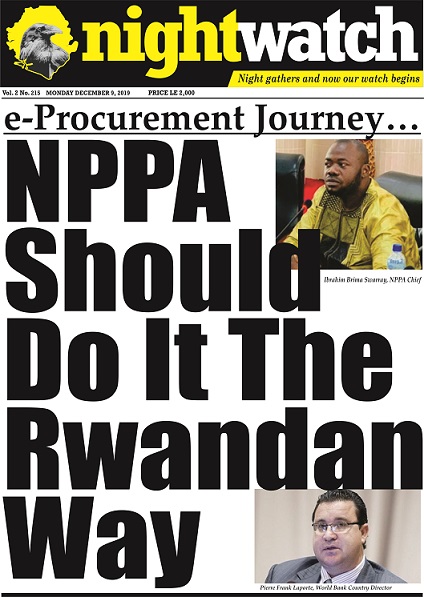The National Public Procurement is increasingly working towards enhancing a transparent and accountable public procurement system with a view to have value for money in the delivery of goods, works and services for the benefit of Sierra Leoneans.
Before now the sector was in shambles with massive corruption,a move-away from acceptable procurement standards and practices, the dictates of the Public Procurement Act of 2006 and the continuous use of sole sourcing as a way of procuring goods ,services and works.
The new leadership at the helm made a huge commitment to stop leakages and this itself was like saying that it will no longer be business as usual in the public procurement sector.
Under the distinguished leadership of the new Chief Executive we have been able to see a strict adherence with the Public Procurement Act of 2016, the Authority has taken on end to end reviews, increasing the visibility and awareness on the functions of the entity, pushing through a robust decentralization process, working with MDAs and other public sector entities in developing annual procurement plans amongst several other reforms.
With support from the World Bank, the journey to establishing an e-procurement system as it obtains in other countries in the sub region has also gone a long way.
A team from the NPPA has already gone on study tour to assess various e-procurement models across the sub-region.
Funding from the World Bank in establishing the initial structures and the provision of equipment for the e-procurement directorate has also been completed.
A study tour was conducted to several countries in the region as part of the actions/activities to introducing the e-procurement platform.
The rationale was for the NPPA to better understand the challenges in terms of rolling out an effective and sustainable e-procurement system.
With this sound footing in terms of establishing the e-procurement platform, emphasis should now be paid to ensuring that we are able to adopt systems that are reliable, sustainable and very much consistent with the Bio Government’s innovation and ICT drive.
The Rwandese with support from the World Bank Public Sector Reform project has been able to successfully drive through the ‘UMUCYO’ e-procurement system which in the local Rwandan language means transparency.
The system consists of an online portal with modules for advertisements, e-bidding and disposal, evaluation, contract management, inspection and acceptance, framework agreements,catalog and shopping mail amongst others.
The system has largely succeed in solving the huge challenges facing public sector procurement in Rwanda especially with regards areas such as inconvenient business registration, inaccurate management information and analytical, lack of a one-stop procurement portal and efficient document records management systems amongst others.
The US$ 7.8 million dollar project is now an envy of the sub region.Anchored on the South Korean model it has been able to deliver some benefits already to the Rwandan people after it was piloted through several Ministries in the country.
Procurement processes are now done in a reduced time with very low cost for both Government officials and contractors.
The single online portal provides all the documents and information required thereby eliminating the need for in person visits and printing cost.
The NPPA against such a backdrop should go for the Rwandan model in its entirety.
It is our hope that, the study tour to various countries including Rwanda and Ghana should have provided the NPPA with an opportunity to understand why all other countries have failed to introduce and pilot through the e-procurement platform to various MDAs with the exception of Rwanda.
The rolling out of the e-procurement infrastructure is critical especially with regards making a decision around what software to use.
The use of off-the-shelve system in Sierra Leone like in the Rwandan case though expensive has a lot of benefits for the country’s drive to mainstream e-governance and innovation to inform critical development programs.
Hosting the software in-house rather relying on a third party companies as host has a lot of advantages such as developing a unique opportunity for Sierra Leone to start developing its national ICT human resource capacity.
As a country we should not allow ourselves to be dumped as it now obtains in the IFIMIS system at the Ministry of Finance.
The IFMIS system which has been in use for over ten years is still facing a number of challenges that have greatly affected its general roll-out and efficiency.
The country has continued to spend huge sums of money in upgrades, patches and change-orders.
The World Bank has been very much supportive to Sierra Leone’s development trajectory and its commitment to funding programs of this nature is unwavering.
The NPPA should go for what has been successfully proven to be working with the required inputs and results.
We should understand why other countries have failed or are still at a snail pace in rolling out the e-procurement infrastructure to MDAs and other entities as currently done in Rwanda.
e-Procurement Journey… NPPA Should do it the Rwandan Way


